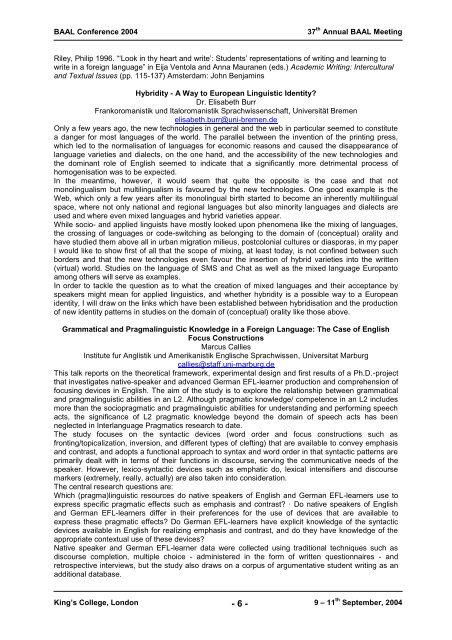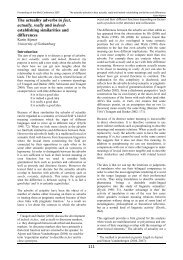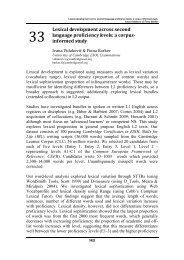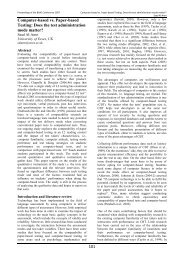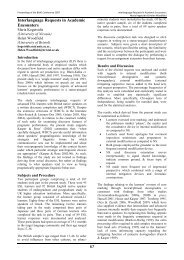Colloquia - British Association for Applied Linguistics
Colloquia - British Association for Applied Linguistics
Colloquia - British Association for Applied Linguistics
Create successful ePaper yourself
Turn your PDF publications into a flip-book with our unique Google optimized e-Paper software.
BAAL Conference 2004 37 th Annual BAAL Meeting<br />
Riley, Philip 1996. “„Look in thy heart and write‟: Students‟ representations of writing and learning to<br />
write in a <strong>for</strong>eign language” in Eija Ventola and Anna Mauranen (eds.) Academic Writing: Intercultural<br />
and Textual Issues (pp. 115-137) Amsterdam: John Benjamins<br />
Hybridity - A Way to European Linguistic Identity?<br />
Dr. Elisabeth Burr<br />
Frankoromanistik und Italoromanistik Sprachwissenschaft, Universität Bremen<br />
elisabeth.burr@uni-bremen.de<br />
Only a few years ago, the new technologies in general and the web in particular seemed to constitute<br />
a danger <strong>for</strong> most languages of the world. The parallel between the invention of the printing press,<br />
which led to the normalisation of languages <strong>for</strong> economic reasons and caused the disappearance of<br />
language varieties and dialects, on the one hand, and the accessibility of the new technologies and<br />
the dominant role of English seemed to indicate that a significantly more detrimental process of<br />
homogenisation was to be expected.<br />
In the meantime, however, it would seem that quite the opposite is the case and that not<br />
monolingualism but multilingualism is favoured by the new technologies. One good example is the<br />
Web, which only a few years after its monolingual birth started to become an inherently multilingual<br />
space, where not only national and regional languages but also minority languages and dialects are<br />
used and where even mixed languages and hybrid varieties appear.<br />
While socio- and applied linguists have mostly looked upon phenomena like the mixing of languages,<br />
the crossing of languages or code-switching as belonging to the domain of (conceptual) orality and<br />
have studied them above all in urban migration milieus, postcolonial cultures or diasporas, in my paper<br />
I would like to show first of all that the scope of mixing, at least today, is not confined between such<br />
borders and that the new technologies even favour the insertion of hybrid varieties into the written<br />
(virtual) world. Studies on the language of SMS and Chat as well as the mixed language Europanto<br />
among others will serve as examples.<br />
In order to tackle the question as to what the creation of mixed languages and their acceptance by<br />
speakers might mean <strong>for</strong> applied linguistics, and whether hybridity is a possible way to a European<br />
identity, I will draw on the links which have been established between hybridisation and the production<br />
of new identity patterns in studies on the domain of (conceptual) orality like those above.<br />
Grammatical and Pragmalinguistic Knowledge in a Foreign Language: The Case of English<br />
Focus Constructions<br />
Marcus Callies<br />
Institute fur Anglistik und Amerikanistik Englische Sprachwissen, Universitat Marburg<br />
callies@staff.uni-marburg.de<br />
This talk reports on the theoretical framework, experimental design and first results of a Ph.D.-project<br />
that investigates native-speaker and advanced German EFL-learner production and comprehension of<br />
focusing devices in English. The aim of the study is to explore the relationship between grammatical<br />
and pragmalinguistic abilities in an L2. Although pragmatic knowledge/ competence in an L2 includes<br />
more than the sociopragmatic and pragmalinguistic abilities <strong>for</strong> understanding and per<strong>for</strong>ming speech<br />
acts, the significance of L2 pragmatic knowledge beyond the domain of speech acts has been<br />
neglected in Interlanguage Pragmatics research to date.<br />
The study focuses on the syntactic devices (word order and focus constructions such as<br />
fronting/topicalization, inversion, and different types of clefting) that are available to convey emphasis<br />
and contrast, and adopts a functional approach to syntax and word order in that syntactic patterns are<br />
primarily dealt with in terms of their functions in discourse, serving the communicative needs of the<br />
speaker. However, lexico-syntactic devices such as emphatic do, lexical intensifiers and discourse<br />
markers (extremely, really, actually) are also taken into consideration.<br />
The central research questions are:<br />
Which (pragma)linguistic resources do native speakers of English and German EFL-learners use to<br />
express specific pragmatic effects such as emphasis and contrast? · Do native speakers of English<br />
and German EFL-learners differ in their preferences <strong>for</strong> the use of devices that are available to<br />
express these pragmatic effects? Do German EFL-learners have explicit knowledge of the syntactic<br />
devices available in English <strong>for</strong> realizing emphasis and contrast, and do they have knowledge of the<br />
appropriate contextual use of these devices?<br />
Native speaker and German EFL-learner data were collected using traditional techniques such as<br />
discourse completion, multiple choice - administered in the <strong>for</strong>m of written questionnaires - and<br />
retrospective interviews, but the study also draws on a corpus of argumentative student writing as an<br />
additional database.<br />
King‟s College, London 9 – 11 th - 6 -<br />
September, 2004


